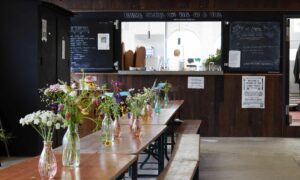
AGloucestershire restaurant is rethinking relationships with customers, suppliers and the entire food economy to fuel an ambitious “pay as you can” model that feeds allcomers, regardless of ability to pay.
In the past year, The Long Table has fed about 20,000 people at below-cost price – many for no charge at all, no questions asked – while rescuing 3.4 tonnes of food destined for the bin and paying local suppliers fair prices for the rest.
It has also made enough money to employ 22 part-time and full-time members of staff on at least the real living wage – no work is done by volunteers – and hopes to replicate the model elsewhere.
“We are, at our simplest, a restaurant,” says Will North, The Long Table’s general manager. “But really what we are is an amazing restaurant where we prioritise being a real living wage employer, [and] we prioritise the kinds of suppliers who not only prioritise [the] planet, but people as well.
“But then what we do is, rather than charge for that, all of our meals are totally pay as you can. There is never any expectation to pay for it. That’s the risk that we take.”
An estimated 8 million adults and 3 million children are facing food insecurity in the UK in 2024 – twice the rate in 2021. After rampant inflation over the past two years, the cost of food has risen by a quarter, and with healthier options costing an average of twice as much per calorie, hospitals have seen an alarming rise in admissions for vitamin and mineral deficiencies and malnutrition, diagnoses doctors have described as rooted in poverty.
Yet every year the UK’s farms, businesses and households, especially, throw away 6.4m tonnes of edible food, enough to feed everyone three meals a day for 11 weeks, says the climate action NGO Wrap.
Aside from the injustice of food being thrown away while children go to bed hungry, such waste has a huge impact on the climate and the wider environment. Taking into account agriculture, manufacture, packaging, distribution, retail, transport, storage and preparation costs, followed by waste treatment and disposal, food waste accounts for approximately 18m tonnes of carbon emissions each year.
The Long Table tackles these interlinked issues at the same time. But it prefers not to focus on problems, says North. “We hold a space where we are all collectively trying to answer a question: what if everyone in our community had access to great food and people to eat it with?”
As befits the name, diners at The Long Table sit together at long, canteen-style tables, in an atmosphere North describes as “radical hospitality”. The restaurant, which operates alongside a bicycle recycling workshop and a secondhand furniture warehouse, opens at 10am for coffee and cake. Lunch is served from noon, five days a week, with dinners also served on Thursdays, Fridays and Saturdays.
